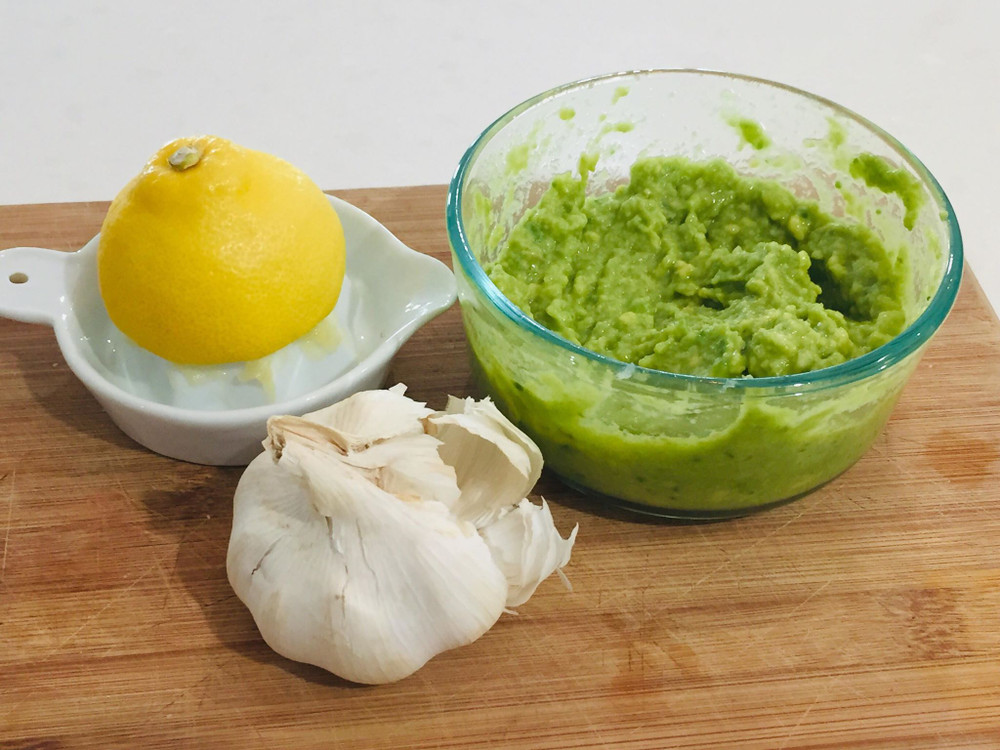
The avocado is a staple GAPS food. Along with this is raw garlic and lemons. Here is a nice and easy way to ensure you get all three in your everyday GAPS diet and I will also show you how you can include them in your meals.
In a bowl, simply mash the avo with a fork and add some crushed garlic (I like 3-4 cloves but that many can have a bite if you are sensitive to raw garlic) and mix well. Squeeze some juice from a lemon (approximately 1-2 tablespoons) and continue to mix and combine all the ingredients together.
Dr Natasha considers raw garlic to be one of the top super foods for the immune system. Lemons are a great detoxing agent and helpful in maintaining the pH balance in the body. Avocados are a rich source of many vitamins, minerals and healthy fats. Most of this fat content is made up of monounsaturated fat which is oleic acid, the same fatty acid found in olives and olive oil.
GAPSters are encouraged to eat avocados daily or at least 3 – 5 times a week. This simple recipe can be easily added to soups or applied as a spread to your favourite nut flour bread. It will keep in the fridge for several days if you seal the container with a lid and the lemons will work to preserve the avocado from going brown. A dash of olive oil drizzled over the top with some himalayan crystal salt when served always works well in combination and again is a recommended practice for GAPS meals.
AVOCADOS ARE A GREAT SOURCE OF
- vitamins C, E, K,
- B-6,
- Riboflavin
- Niacin
- folate
- pantothenic acid
- magnesium
- potassium
- Lutein
- beta-carotene
- omega-3 fatty acids
The high fat content in avocados is a good thing because it is the same fat from oleic acid, which is the same monosaturated fatty acid contained in olive oil. With the GAPS diet, we steer clearly away from hydrogenated oils, trans fats, oxidised fats like safflower, canola, corn or other vegetable oils. Avocado oil can be drizzled over meals and salads, just as olive oil is used liberally in the GAPS diet. Avocado oil also has a relatively high smoke point compared to olive oil so it is a better oil to cook with but most of the nutrients will be destroyed.It is better to use coconut oil or animal fats for cooking.
Research undertaken by Awad and Fink, 2000; Piironen et al., 2000; Kritchevsky and Chen, 2005) report on an in vitro study showing that the avocado pulp, specifically tocopherols, lutein, and other carotenoids (as active constituents), contain growth inhibitory effects to fight against cancer.
Studies by Lu et, 2005 and Sudhir, 2005 have shown the pharmacologically active constituents of the avocado plant to produce antifungal, anti-inflammatory, and antioxidant activity and that this is a natural source that can easily be obtained and benefit from if consumed daily. Further to this, phytosterols and phytostanols have been shown to decrease serum levels of cholesterol when avocados are consumed daily.
Eating avocados may therefore help protect your heart and optimize cholesterol levels. They are rich in healthy fats that your body can easily use for energy. People who eat avocados have been found to have higher levels of beneficial HDL cholesterol than those who do not.
One of the most interesting findings about avocados is how it has the ability to reduce tummy fat. Generally speaking, people who eat more avocados weigh less and have a smaller waistline compared to people who don't.
Avocados are also a good source of fibre. The fibre is both soluble, which amounts to 75 percent, and insoluble fiber, the former of which is linked to good gut flora, which affects your body's overall health.
Avocados have a tendency to make you feel fuller for longer and consequently more satisfied and more unlikely to snack between meals.
Another interesting fact about the benefits of avocados is that they carry a very light load of chemical pesticide spray residue in comparison with other plant-based foods, so it's not necessary to try to find (or grow) organic varieties if you do not have them easily available.
Are you motivated to make a conscious effort to include the super healthy foods in your diet this year and commit to your health goals?It really is easy if you just check in with yourself and your continued effort to include the GAPS staple foods.
Journal of Nutrition March 1, 2005:135(3); 431-436
Phytotherapy Research April 10, 2017
